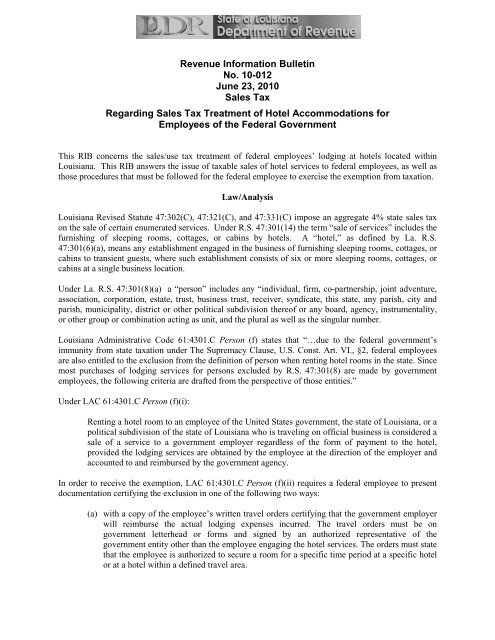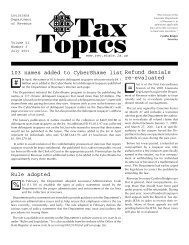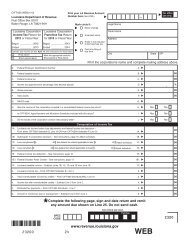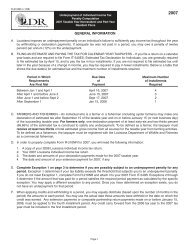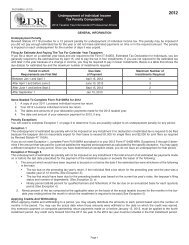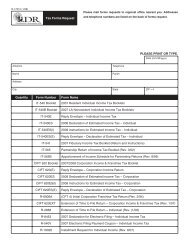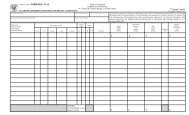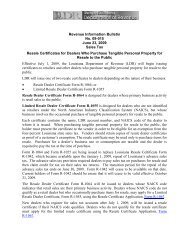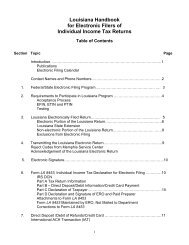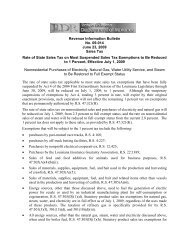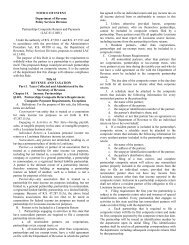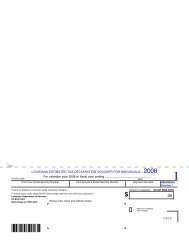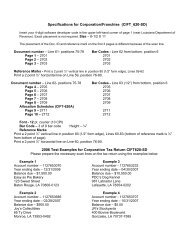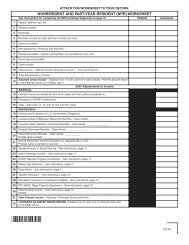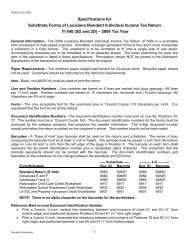10-012 - Louisiana Department of Revenue
10-012 - Louisiana Department of Revenue
10-012 - Louisiana Department of Revenue
You also want an ePaper? Increase the reach of your titles
YUMPU automatically turns print PDFs into web optimized ePapers that Google loves.
<strong>Revenue</strong> Information BulletinNo. <strong>10</strong>-<strong>012</strong>June 23, 20<strong>10</strong>Sales TaxRegarding Sales Tax Treatment <strong>of</strong> Hotel Accommodations forEmployees <strong>of</strong> the Federal GovernmentThis RIB concerns the sales/use tax treatment <strong>of</strong> federal employees’ lodging at hotels located within<strong>Louisiana</strong>. This RIB answers the issue <strong>of</strong> taxable sales <strong>of</strong> hotel services to federal employees, as well asthose procedures that must be followed for the federal employee to exercise the exemption from taxation.Law/Analysis<strong>Louisiana</strong> Revised Statute 47:302(C), 47:321(C), and 47:331(C) impose an aggregate 4% state sales taxon the sale <strong>of</strong> certain enumerated services. Under R.S. 47:301(14) the term “sale <strong>of</strong> services” includes thefurnishing <strong>of</strong> sleeping rooms, cottages, or cabins by hotels. A “hotel,” as defined by La. R.S.47:301(6)(a), means any establishment engaged in the business <strong>of</strong> furnishing sleeping rooms, cottages, orcabins to transient guests, where such establishment consists <strong>of</strong> six or more sleeping rooms, cottages, orcabins at a single business location.Under La. R.S. 47:301(8)(a) a “person” includes any “individual, firm, co-partnership, joint adventure,association, corporation, estate, trust, business trust, receiver, syndicate, this state, any parish, city andparish, municipality, district or other political subdivision there<strong>of</strong> or any board, agency, instrumentality,or other group or combination acting as unit, and the plural as well as the singular number.<strong>Louisiana</strong> Administrative Code 61:4301.C Person (f) states that “…due to the federal government’simmunity from state taxation under The Supremacy Clause, U.S. Const. Art. VI., §2, federal employeesare also entitled to the exclusion from the definition <strong>of</strong> person when renting hotel rooms in the state. Sincemost purchases <strong>of</strong> lodging services for persons excluded by R.S. 47:301(8) are made by governmentemployees, the following criteria are drafted from the perspective <strong>of</strong> those entities.”Under LAC 61:4301.C Person (f)(i):Renting a hotel room to an employee <strong>of</strong> the United States government, the state <strong>of</strong> <strong>Louisiana</strong>, or apolitical subdivision <strong>of</strong> the state <strong>of</strong> <strong>Louisiana</strong> who is traveling on <strong>of</strong>ficial business is considered asale <strong>of</strong> a service to a government employer regardless <strong>of</strong> the form <strong>of</strong> payment to the hotel,provided the lodging services are obtained by the employee at the direction <strong>of</strong> the employer andaccounted to and reimbursed by the government agency.In order to receive the exemption, LAC 61:4301.C Person (f)(ii) requires a federal employee to presentdocumentation certifying the exclusion in one <strong>of</strong> the following two ways:(a) with a copy <strong>of</strong> the employee’s written travel orders certifying that the government employerwill reimburse the actual lodging expenses incurred. The travel orders must be ongovernment letterhead or forms and signed by an authorized representative <strong>of</strong> thegovernment entity other than the employee engaging the hotel services. The orders must statethat the employee is authorized to secure a room for a specific time period at a specific hotelor at a hotel within a defined travel area.
RIB<strong>10</strong>-<strong>012</strong>(b) If written travel orders are unavailable or if the travel orders are incomplete or insufficient tosatisfy all <strong>of</strong> the requirements in §4301.C. Person (f)(ii)(a), an exemption certificate signedby the employee and the authorized agent <strong>of</strong> the governmental agency other than theemployee will certify the transaction’s exempt status. The hotel can accept the department’scertificate entitled Certificate <strong>of</strong> Governmental Exemption from the Payment <strong>of</strong> HotelLodging Taxes or one used by federal agencies, provided the form states that the employee’sexpenses are reimbursed by the employer in the actual amount incurred.<strong>Louisiana</strong> Administrative Code 61:4301.C Person (f)(iii) further holds that:Hotels must retain this documentation to support a sales tax deduction for room rentals togovernment employees on <strong>of</strong>ficial business. Failure to do so will cause the deduction to bedisallowed unless the hotel can provide competent independent evidence to certify theexemption’s validity. The exemption will also be disallowed if it is determined that thedocumentation was obtained fraudulently or that the hotel knew the documentation was invalidwhen the employee presented it.Requirements to Meet the ExemptionIn order to qualify for the exemption the federal government employee on <strong>of</strong>ficial business must followthe appropriate procedures, which vary depending on the form <strong>of</strong> payment. Generally, a federalgovernment employee on <strong>of</strong>ficial business will be exempt from state taxation if the employee is acting atthe direction <strong>of</strong> the employer and is accounted to and reimbursed by the government agency, regardless <strong>of</strong>the form <strong>of</strong> payment. However, in order for a federal government employee on <strong>of</strong>ficial duty to qualify forthe exemption, the employee must present one <strong>of</strong> the following two forms <strong>of</strong> documentation, as requiredby LAC 61:4301.C. Person (f)(ii). The first is met by presentation <strong>of</strong> a copy <strong>of</strong> the employee’s writtentravel orders certifying that the government employer will reimburse the actual lodging expensesincurred. The travel orders must be on government letterhead or forms and signed by an authorizedrepresentative <strong>of</strong> the government entity, other than the employee engaging the hotel services, and statethat the employee is authorized to secure a room for a specific time period at a specific hotel or at a hotelwithin a defined travel area.Alternatively, if written travel orders are unavailable or if the travel orders are incomplete or insufficientto satisfy all <strong>of</strong> the requirements in §4301.C. Person (f)(ii)(a), the federal government employee on<strong>of</strong>ficial business may comply with LAC 61:4301.C. Person (f)(ii)(b) by providing a qualified exemptioncertificate as set forth therein.Methods <strong>of</strong> PaymentIn Rev. Ruling Number 07-008, the <strong>Department</strong> determined the taxability <strong>of</strong> certain purchases made byemployees <strong>of</strong> the federal government using government issued federal credit cards, otherwise called“SmartPay Cards”. The cards, issued by the United States government, come in four varieties, including:purchase, fleet, travel, and integrated. The <strong>Department</strong> determines that purchase and fleet cards areexempt from taxation as they are always billed directly to the United States government. In addition,travel cards, which can be used at hotels, are exempt from sales tax if the charges are centrally billed tothe United States government and directly paid by the Unites States government. Contrarily, individuallybilled charges, i.e. those charges billed to and paid by the government employee who is subsequentlyreimbursed by the United States government, are subject to sales tax. To establish the status <strong>of</strong> a travelcard, the sixth digit <strong>of</strong> a travel card determines whether the charge is centrally or individually charged.Travel cards whose 6 th digit is 0,6,7,8 or 9 are centrally billed and exempt from sales tax. Travel cardswhose 6 th digit is 1, 2, 3, or 4 are individually billed and subject to sales tax. The ruling further explains
RIB<strong>10</strong>-<strong>012</strong>that a merchant need not obtain an exemption certificate to substantiate tax-exempt status as governmentissuedcredit cards can be identified by their type and account numbering sequence. Instead, the vendorneed only require identification establishing the person’s identity and status as a U.S. governmentemployee, such as an employee photo identification card.ConclusionIf a federal government employee on <strong>of</strong>ficial business should pay for hotel accommodations using agovernment issued credit card or a so-called “SmartPay Card,” the employee need not comply with therequirements <strong>of</strong> LAC 61:4301.C. Person (f)(ii)(a)-(b). If the sixth digit <strong>of</strong> the travel card is 0, 6,7,8, or 9,indicating the charge is directly billed to the United States government, the vendor need only requireidentification establishing the person’s identity and status as a U.S. government employee, such as anemployee photo identification card. If the sixth digit <strong>of</strong> the travel card is any other number, the federalgovernment employee on <strong>of</strong>ficial duty must present one <strong>of</strong> the two forms <strong>of</strong> documentation required inLAC 61:4301.C Person (f)(iii)(a)-(b) in order for the transaction to be exempt from sales and use tax.If you should have any questions or need additional information, please contact the Policy ServicesDivision at (225) 219-2780.Sincerely,Cynthia BridgesSecretaryA <strong>Revenue</strong> Information Bulletin (RIB) is issued under the authority <strong>of</strong> LAC 61:III.<strong>10</strong>1.D. A RIB is an informalstatement <strong>of</strong> information for the pubic and employees that is general in nature. A RIB does not have the force andeffect <strong>of</strong> law and is not binding on the public or the <strong>Department</strong>.


